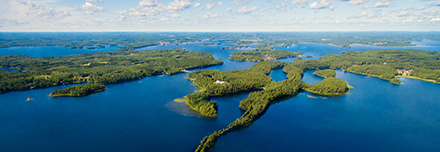
Finland, which currently holds the EU’s presidency until the end of the year, is lobbying to keep forestry a national competency – undermining a key part of the EU’s climate efforts to reduce emissions. The EU considers land use and forestry two of the most important sectors for the bloc’s climate policy as they include the use of soils, trees, plants, biomass, and timber. Source: EU Observer
Bearing in mind the climate targets for 2030 and 2050, the European Union designed a regulation for land use and forestry (known as LULUCF), adopted in 2018, to ensure that the accounted total emissions in the sector do not exceed the ‘accounted sinks’ – also known as “no-debit” rule.
However, the Finnish committees of agriculture and forestry, economy and environment, in agreement with the government in Helsinki, rejected this updated framework last week.
“It is particularly important that forestry policy continues to be a matter for national decision-making” since this sector has a large impact on the state economy, said the Finnish committee of agriculture.
The issue is of particular saliency in Finland, because across Europe, Finland (71% of total land area) and Sweden (67%) are the most heavily forested countries, followed by Slovenia (64%), Estonia (58%) and Latvia (56%).
During negotiations around the EU’s land use and forestry regulation, other climate-friendly countries, such as France, Finland, Sweden, and Austria, were also trying to weaken the EU’s proposal. However, only Finland lobbied and obtained “extra” flexibility to manage its emissions – but exclusively under the category of managed forest land.
All member states can benefit from certain flexibility under this regulation. For example, if the accounted removals of emissions are greater than the accounted emissions from land use in the first period (2021-2025), these can be banked and used in the next period (2026- 2030).
However, the Finnish committee for agriculture and forestry believes that the recent changes of this regulation “still leaves too much scope for real flexibility in the hands of the commission”.
In addition to its opposition to EU’s land use and forestry regulation, Finland also disagrees with the Climate Action Regulation (CAR), which sets down emission reduction obligations to all EU member states – affecting sectors like agriculture, heating of buildings or waste management.
According to the last proposal, Finland must reduce emissions by at least 39%, compared with 2005 by 2030. However, the Finnish committees of agriculture and forestry, economy and environment, believe that this plan is “far too ambitious” and Finland cannot accept it.
Both the LULUCF and the CAR regulations are part of EU’s efforts to reduce overall greenhouse gas emissions by at least 40% by 2030.
Earlier this month two NGOs, Fern and the Finnish Association for Nature Conservation (FANC), accused the Finnish government of trying to “renegotiate its way out of accounting for its deforestation”.
“Finland’s actions undermine the credibility of their [EU’s] presidency. Finland can’t just talk about its climate ambition, it must deliver on its commitments to limit global warming to 1.5 degrees and end deforestation,” said policy officer from FANC, Hanna Aho.
“The flexibilities are problematic to start with as using them could endanger EU achieving its target as a whole.”
According to NGO Fern, the lobbying and actions carried out by Finland concerning the LULUCF regulation have also had an impact on eastern European countries like, Romania and Slovenia which are also calling for exemptions.
“This region has seen an upturn in climate-related forest degradation, partly due to poor land management. Countries have asked for both financial support to protect and restore these forests, and for the right to log their way out of the[se] problem[s],” said Kelsey Perlman, forest, and climate campaigner at Fern.







